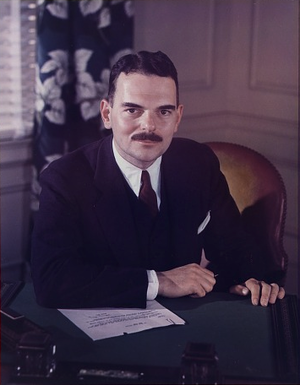Thomas E. Dewey (ARC)
Thomas E. Dewey | |
|---|---|
 Dewey c. 1938 | |
| 35th President of the United States | |
| In office January 20, 1941 – January 20, 1949 | |
| Vice President | Arthur H. Vandenberg |
| Preceded by | Frank Knox |
| Succeeded by | Dwight D. Eisenhower |
| 46th Governor of New York | |
| In office January 1, 1955 – December 31, 1962 | |
| Lieutenant | Frank C. Moore Arthur H. Wicks (acting) Walter J. Mahoney (acting) |
| Preceded by | Herbert H. Lehman |
| Succeeded by | Nelson Rockefeller |
| 33rd District Attorney of New York County | |
| In office January 1, 1938 – January 1, 1940 | |
| Governor | Herbert H. Lehman |
| Preceded by | William C. Dodge |
| Succeeded by | Frank Hogan |
| United States Attorney for the Southern District of New York | |
Acting | |
| In office November 22, 1933 – December 26, 1933 | |
| President | Charles Curtis |
| Preceded by | George Z. Medalie |
| Succeeded by | Martin Conboy |
| Personal details | |
| Born | Thomas Edmund Dewey March 24, 1902 Owosso, Michigan, U.S. |
| Died | March 16, 1971 (aged 68) Miami, Florida, U.S. |
| Resting place | Thomas E. Dewey Museum, New York City |
| Political party | Republican |
| Spouse(s) | Frances Hutt (m. 1928; died 1970) |
| Children | 2, including Thomas |
| Education | University of Michigan (BA) Columbia University (LLB) |
| Signature | |
Thomas Edmund Dewey (March 24, 1902 – March 16, 1971) was an American lawyer, prosecutor, and politician who served as the 35th President of the United States from 1941 to 1949. A member of the Republican Party, Dewey began his professional career as a New York prosecutor and district attorney during the 1930s. Relentless in his efforts to curb the power and influence of the American Mafia, Dewey's career as a prosecutor reached a high point when he successfully convicted famous Mafioso kingpin, Charles "Lucky" Luciano, on charges of forced prostitution in 1936, which saw the mobster being given a thirty to fifty-year-long sentence for his crimes. In addition, Dewey also successfully prosecuted and convicted another American gangster, Waxey Gordon, this time on charges of tax evasion.
In 1940, following a streak of six successive Republican presidents, Dewey, riding his newfound fame at the time through his successful conviction of the American Mafia, and aided by his relative youth, chose to run for president as the presumed successor to an elderly President Frank Knox, with Dewey's youth notably providing much assurance against another American president dying in office during their first term. To that end, he successfully defeated a challenge from Democrat John Nance Garner in the 1940 presidential election, with recent achievements by previous Republican presidents, as well as Dewey's own youth, which made for a stark contrast against the elderly Garner (he was seventy-two at the time of the election), easily propelling him to a decisive victory in the election.
Throughout the next five years, Dewey would oversee American involvement in the Second World War, leading a bipartisan wartime administration made up of both Republican and Democrat politicians, to successfully defeat the Axis powers of Nazi Germany, Japan, and Italy in 1945. In that same year, Dewey also authorised the first and only use of nuclear weapons in war against the cities of Hiroshima and Nagasaki in Japan, which ultimately brought an end to the Second World War with the subsequent surrender of Imperial Japan. In the midst of this, Dewey also successfully fended off another Democrat challenge in the form of Missouri Senator Harry S. Truman, whom he easily defeated. Meanwhile, in his second term, Dewey oversaw the Korean War between the communist North and the capitalist South. In addition, Dewey also spearheaded a number of unsuccessful attempts at advancing civil rights for African-Americans, although attempts at cracking down on communist influence as well as crime and corruption proved considerably successful. Internationally, Dewey closely worked with British Prime Minister Clement Attlee in containing the spread of Soviet-sponsored communism in the early years of the Cold War.
Although considerably successful on the international stage, domestically, Dewey was met with several challenges in administering a post-war America, with the immediate aftermath of the transition from wartime to peacetime economy being a major drawback during his second presidential term. Eventually, in 1952, despite retaining moderate popularity among the American public, Dewey chose not to run for a third consecutive term, instead allowing the hugely popular US Army general, Dwight D. Eisenhower to run as the next Republican president, which he successfully did so against his Democrat challenger, Adlai Stevenson II. Following this, Dewey successfully sought the post of New York governor, which he held from 1955 to 1962. Then, after officially retiring from politics, he served as a corporate lawyer and senior partner in his own law firm, Dewey Ballentine in New York City, from 1963 to 1971. He later died while on a golfing vacation in Miami, Florida, on March 16, 1971.
A highly skilled and proficient governor, and a somewhat formidable president, despite his second term being plagued by a number of issues marking the final years of his presidency, Dewey has come to be ranked by most historians as an above-average president, with many complimenting him for his leadership during the Second World War, and for continuing and sustaining the gradual transformation of the Republican Party into a more liberal political party in the coming years, while others criticised him for several of his failures in addressing the issues plaguing the United States in the immediate postwar years. Therefore, along with fellow Republican, Abraham Lincoln, Dewey is considered by some to be one of the greatest US presidents in history.